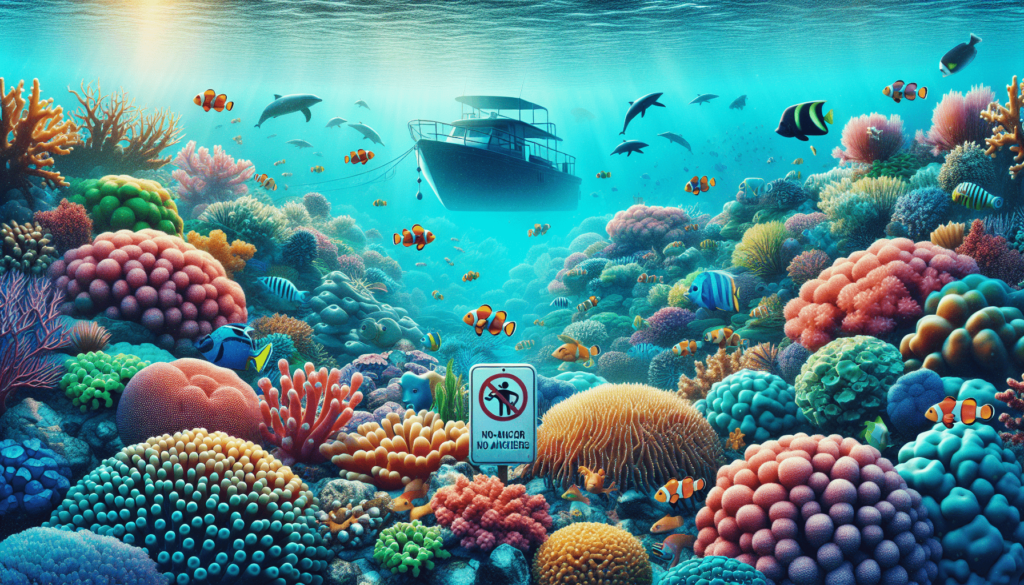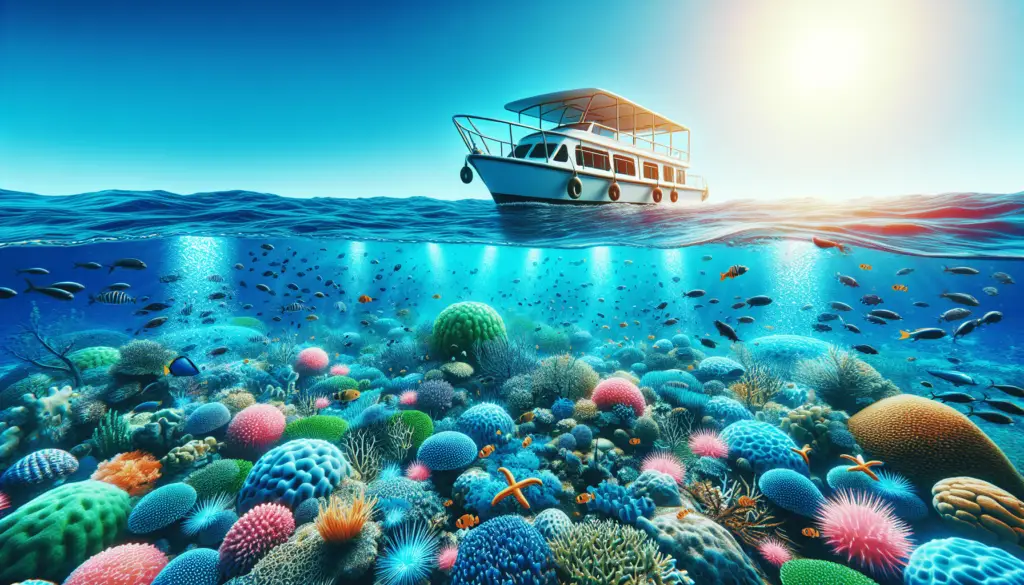As a passionate boater, it’s time to shift focus to incorporate responsibility towards the environment in which you practice your passion, specifically in regards to the health of our oceans and its ecosystems. The article “Protecting Coral Reefs And Underwater Ecosystems As A Responsible Boater”, helps the modern-day mariner recognize their role in the preservation of these underwater kingdoms. You’ll gather knowledge on the importance of coral reefs, the threats they face, and precise steps you, as a conscientious boater, can take to safeguard these beautifully intricate yet fragile habitats.

Understanding the Importance of Coral Reefs
Coral reefs are much more than just beautiful underwater landscapes for divers to explore. They play a critical role in the world’s ecosystem, and their importance cannot be overstated.
The role of coral reefs in the ecosystem
Marvellously complex and incredibly diverse, coral reefs are often dubbed the ‘rainforests of the sea’. They are essential to the survival of numerous marine species, often serving as nursery grounds and shelters for a host of marine animals. Reefs are also responsible for the production of a significant amount of oxygen that you breathe daily, and they play a vital role in the nitrogen and carbon cycles.
Economic value of coral reefs
In addition to their ecological importance, coral reefs have a profound economic value. They support the livelihoods of millions of people who directly depend on the fishing, tourism, and recreational activities they provide. According to some estimates, the annual global value of coral reefs is a staggering $375 billion – that’s a lot of money generated by these underwater structures.
Coral reefs and climate change
Coral reefs are also incredibly sensitive indicators of the health of our planet. The rising temperatures and ocean acidification associated with climate change pose severe threats to their welfare and – by extension – to the delicate balance of marine ecosystems they maintain.
Threats to Coral Reefs and Underwater Ecosystems
There are many dangers that coral reefs face, several of which are from human activities, and alarmingly, boating sits high on this list.
Physical damage by boating activities
Coral reefs are incredibly delicate, and even the slightest contact can cause massive harm. When boats drop anchor on a reef, they can smash the corals to smithereens, causing irreversible damage. Propellers can also inadvertently cut into reefs when navigating shallow waters.
Chemical damage from boat-related waste
Another significant problem is chemical pollution. Leaks of fuel, oil, and other harmful substances from boats can poison the reef and the creatures that inhabit it. Moreover, improperly disposed waste can also suffocate corals, thereby inhibiting their ability to grow and reproduce.
Impacts of global warming and climate change
Climate change exacerbates these problems, leading to increased storm intensity and sea levels, which can further damage reefs, as well as cause ‘coral bleaching’, a catastrophic event that occurs when rising water temperatures cause corals to expel the symbiotic algae that provide them with nutrients.
Comprehending the Footprint of Boating Activities
Boating can feel like a low-impact pastime on the surface, but it’s crucial to comprehend the full scope of the harm that seemingly innocent activities can wreak on coral reefs.
Understanding how common boating practices can harm coral reefs
Many boaters might not even realize they’re causing damage. Regular practices like anchoring, propeller use in close proximity to reefs, and failure to dispose of waste properly can pose serious threats to these valuable ecosystems.
Identifying signs of damage caused by boats
Some common signs of boat damage include broken or crushed coral and oil or fuel residue on the water’s surface. The sudden disappearance of marine life in an area may also indicate the presence of harmful pollution.
Highlighting the implications of unchecked boating activities
Unchecked boating activities can cause serious and lasting damage to reefs, leading to decreases in marine life and biodiversity, upsetting the balance of entire ecosystems, and severely impacting local economies that depend on healthy reefs for tourism and fishing.
Adopting Responsible Boating Practices
The good news is that boating and coral reef conservation are not mutually exclusive. Here’s how you can enjoy your time on the water without causing harm.
Complying with no-anchor zones
Firstly, obey no-anchor zones religiously. These are areas designated to protect reefs and other ecologically important underwater features. If anchoring is necessary, always opt for sandy areas away from corals.
Ensuring proper waste disposal
It’s also important to take the cleanliness of your boat seriously. Dispose of all waste properly – that includes everything from food scraps to engine oil.
Practising slow and controlled boating techniques
Take care to drive your boat slowly and carefully near reefs to avoid coming into contact with them.
Avoiding direct contact with reefs during underwater activities
When snorkelling or diving, make sure not to touch, stand on, or collect corals. Even the slightest physical contact can cause devastating damage.

Education and Training for Boaters
Awareness is the first step towards prevention. Proper education can help boaters understand and appreciate the importance of protecting coral reefs.
Importance of boating education in preventing coral reef damage
Understanding how coral reefs operate and why they need our protection can drastically change how boaters interact with the marine environment. It also empowers individuals to make informed decisions that prioritize sustainability.
Boating safety courses covering reef protection
Many boating safety courses now include a focus on reef protection, providing valuable information and practical solutions to minimise potential harm.
Accessing educational materials and resources
There’s a wealth of educational material available online from various marine conservation organisations. These resources offer tips and advice on responsible boating practices, increasing awareness about how individual actions can impact the overall health of our coral reefs.
Role of Government in Protecting Coral Reefs
Government initiatives are essential to ensuring boating practices comply with sustainable standards.
Boating laws and regulations to protect coral reefs
Government bodies have a responsibility to implement and enforce regulations that protect coral reefs from boating-related damages. This could include zoning laws specifying where boats can anchor, speed limits to prevent accidental run-ins with reefs, and penalties for improper waste disposal.
Government initiatives to educate boaters
In addition to implementing strict laws, governments can also launch educational campaigns to increase public awareness of the importance of coral reef conservation.
Penalties for irresponsible boating behaviour
Ensuring consequences for harmful boating practices is fundamental. Penalties can deter reckless behaviour, thereby reducing the risk of damage to the coral reefs.
Involvement of Local Communities in Reef Conservation
Local communities living near coral reefs often have the most at stake when it comes to conservation, and empowering these communities is key to effective protection.
Community-driven reef protection initiatives
These initiatives could involve local volunteers patrolling reef areas, educating boaters about the importance of conservation, or implementing practices such as sustainable fishing to support the health of the reefs.
Empowering local communities to oversee boating practices
By giving communities a sense of ownership over their local reefs, they’re more likely to take an active role in overseeing boating activities and reporting any harmful incidents.
Local community partnerships with government and NGOs for reef conservation
Working in tandem with larger organisations can help local communities access the resources and support they need to protect their local reefs effectively.
Technological Innovations for Reef Protection
In an era of rapidly evolving technology, we are seeing an array of tools and devices being developed to help protect and monitor the health of our reefs.
Role of technology in monitoring and protecting coral reefs
Advanced technologies such as satellite imaging and underwater drones can monitor the condition of reefs and track boat movements to ensure compliance with regulations.
Introduction to equipment and devices for reef-safe boating
There are now devices available for boaters that help navigate safely around reefs, such as maps showing where no-anchor zones are or equipment that indicates the depth of the waters surrounding reefs.
Potential future technological advancements
In the future, you might see even more high-tech solutions like GPS enabled anchors that can avoid causing damage, or robot drones that can repair damaged areas of the reef.
Case Studies of Successful Reef Protection
Several places around the world offer excellent examples of how boaters, local communities, governments, and technology can all come together to conserve coral reefs.
Noteworthy examples of effective reef protection efforts
Areas like the Great Barrier Reef in Australia and Biscayne National Park in the US have implemented robust conservation strategies, involving strict regulations, community involvement, and adoption of technology to successfully protect and even rehabilitate areas of their reefs.
Lessons learned from successful initiatives
These cases teach us that a multi-faceted approach—combining regulation, education, technology, and active community involvement—is the most effective way to conserve our reefs.
Applying successful strategies to other areas
By studying successful reef conservation programs, other regions can adapt and implement similar strategies suited to their specific needs and challenges.
Moving Forward: The Future of Coral Reef Conservation
There’s a lot of work to be done, but with the right attitude and commitment, we can protect our precious coral reefs and ensure a vibrant, thriving marine ecosystem for generations to come.
Discussing potential challenges and trends in reef conservation
Climate change remains a significant challenge, with rising temperatures and acidification posing existential threats to coral reefs. However, the growing recognition of the importance of reefs and the urgency to protect them is promising and shows an encouraging trend towards sustainable practices.
Role of personal responsibility and active involvement in protecting coral reefs
Each one of us, especially if we’re partaking in boating, snorkelling, or other marine activities, has a part to play in safeguarding these vibrant ecosystems. By adopting responsible practices, spreading awareness, and supporting protective initiatives, we can make a tangible difference.
Long-term strategies for sustainable reef conservation
Long-term strategies must encompass comprehensive education, stringent regulations, and utilization of technological advances while fostering a culture of respect for the environment among people who regularly interact with coral reefs. Protecting these significant underwater structures is not a short-term task but rather an ongoing commitment that will benefit not only marine life but also human life for generations to come. Let’s all strive to be responsible boaters and take action to safeguard our precious coral reefs.

